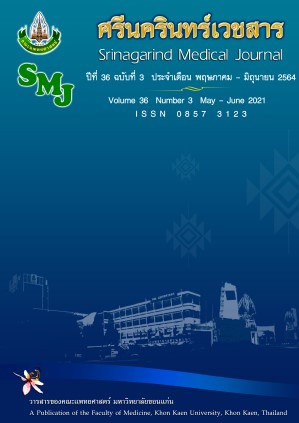Factors Associated with Using Online Social Media among Patients with Breast Cancer Receiving Chemotherapy
Keywords:
Factors; online social media used; breast cancer; chemotherapyAbstract
Background and Objectives: Breast cancer is the fifth most common cause of death from cancer among women around the world. Breast cancer treatments may have many side effects in patients, such as hair loss, mouth sore, nausea, diarrhea and loss of appetite. The patients used online social media for searching the health information concerning their treatment. This study aimed to investigate the factors associated with online social media (OSM) used in breast-cancer patients (BP) receiving chemotherapy.
Methods: A cross-sectional study was conducted among breast-cancer patients receiving chemotherapy at Ubon Ratchathani Cancer Hospital, Ubon Ratchathani province during the period April to December 2019. Data were collected by questionnaires comprising socio-demographic characteristics, online social media usage behavior and an instrument to measure health-related quality of life. The obtained data were analyzed using descriptive and analytic statistics with a computerized statistical package.
Result: A total of 204 BP participated in the study; 43.63% had ever used online social media. The factors which were significantly related to OSM among BP included: patients over 60 years of age, secondary education level and occupation (p<0.05).
Conclusion: Age, education level and occupation represent relate to online social media for breast-cancer patients. Therefore, health services authority should be taken the factors of age, education, and occupation to consider in providing information about breast cancer through the OSM, which are popular among breast-cancer patients, easy-to-understand information to meet the needs of patients.
References
2. W. Imsamran, P.Supattagorn, I. Chiawiriyabunya, K. Namthaisong, A. Pattatang, M.Wongsena, et al. Cancer in Thailand IX, 2013-2015. Bangkok. [Internet]. 2020 [cited Apr 27 2020]. Available from: http://www.nci.go.th/th/File_download/Nci%20Cancer%20Registry/In%20Cancer%20in%20Thailand%20IX%20OK.pdf.
3. World Health Organization. Cancer tomorrow. [Internet]. 2020. [cited Sep 11 2020]. Available from: https://gco.iarc.fr/tomorrow/graphic-isotype?type=0&type_sex=0&mode=population&sex=2&po
pulations=764&cancers=20&age_group=value&apc_male=0&apc_female=0&single_unit=5000&print=0.
4. Morales L, Alvarez-Garriga C, Matta J, Ortiz C, Vergne Y, Vargas W, et al. Factors associated with breast cancer in Puerto Rican women. J Epidemiol Glob Health 2013; 3: 205-215.
5. Nounou MI, ElAmrawy F, Ahmed N, Abdelraouf K, Goda S, Syed-Sha-Qhattal H. Breast cancer: conventional diagnosis and treatment modalities and recent patents and technologies. Breast Cancer (Auckl) 2015; 9: 17-34.
6. Tiezzi MF, de Andrade JM, Romão AP, Tiezzi DG, Lerri MR, Carrara HA, et al. Quality of life in women with breast cancer treated with or without chemotherapy. Cancer Nurs 2017; 40: 108-16.
7. Mikal JP, Grande SW, Beckstrand MJ. Codifying online social support for breast cancer patients: retrospective qualitative assessment. J Med Internet Res [Internet]. 2020 [cited Apr 27 2020] Available from: https://www.jmir.org/2019/10/e12880/pdf.
8. Rajagopalan MS, Khanna VK, Leiter Y, Stott M, Showalter TN, Dicker AP, et al. Patient-oriented cancer information on the internet: a comparison of wikipedia and a professionally maintained database. J Oncol Pract 2011; 7: 319-323.
9. Chae BJ, Lee J, Lee SK, Shin H-J, Jung S-Y, Lee JW, et al. Unmet needs and related factors of Korean breast cancer survivors: a multicenter, cross-sectional study. BMC cancer 2019; 19: 839. [cited Apr 27 2020]. Available from: https://bmccancer.biomedcentral.com/articles/10.1186/s12885-019-6064-8
10. Orem DE, Taylor SG. Reflections on nursing practice science: the nature, the structure, and the foundation of nursing sciences. Nurs Sci Q 2011; 24: 35-41.
11. Katabalo DM, Raphael M, Stanley M, Karoli M, Nestory M. Awareness of chemotherapy side effects and attitude towards chemotherapy use among cancer patients attending oncology clinic at Bugando Medical Centre, in Mwanza, Northern Tanzania. JDDT 2018; 8: 448-54. [Internet]. 2018 [cited May 1 2020]; Available from: http://jddtonline.info/index.php/jddt/article/download/1900/1365
12. Pattanaphesaj J, Thavorncharoensap M. Measurement properties of the EQ-5D-5L compared to EQ-5D-3L in the Thai diabetes patients. Health Qual Life Outcomes 2015 [Internet]. 2020 [cited May 2 2020] Available from: https://www.ncbi.nlm.nih.gov/pmc/articles/PMC4328309/pdf/12955_
2014_Article_203.pdf.
13. Nootjarin Y, Onanong W. Utility assessment in patients with metastatic colorectal cancer at Surin Hospital. Thai Journal of Pharmacy Practice TJPP 2019; 11 :448-54. [Internet]. 2019 [cited May 1 2020] Available from: https://he01.tci-thaijo.org/index.php/TJPP/article/view/171397/123118
14. Thackeray R, Crookston BT, West JH. Correlates of health-related social media use among adults. J Med Internet Res 2013;15:e21. [Internet]. 2020 [cited May 1 2020];11(1):448-54. Available from: https://www.jmir.org/2013/1/e21/pdf
15. Kye SY, Lee MH, Yoo J, Oh KH, Jun JK. Factors affecting satisfaction with cancer information provided through the social networking services of the National Cancer Information Center in Korea. Epidemiol Health [Internet]. 2017 [cited Apr 27 2020] 2017;39(0):e2017057-0. Available from: https://www.e-epih.org/journal/view.php?doi=10.4178/epih.e2017057
16. Potdar R, Thomas A, DiMeglio M, Mohiuddin K, Djibo DA, Laudanski K, et al. Access to internet, smartphone usage, and acceptability of mobile health technology among cancer patients. Support. Care Cancer 2020; 28: 5455-5461.
17. Mikal JP. Online social support among breast cancer patients: longitudinal changes to Facebook use following breast cancer diagnosis and transition off therapy. J Cancer Surviv 2020; 14: 322-330.
18. Shea-Budgell MA, Kostaras X, Myhill KP, Hagen NA. Information needs and sources of information for patients during cancer follow-up. Curr Oncol 2014; 21 :165-173.
19. Potdar R, Thomas A, DiMeglio M, Mohiuddin K, Djibo DA, Laudanski K, et al. Acceptability of mobile health technology among cancer patients. J Clin Oncol 2019 ; 37. [Internet]. 2020 [cited Apr 29 2020] Available from: https://ascopubs.org/doi/abs/10.1200/JCO.2019.37.15_suppl.e18139
20. Bernat JK, Skolarus TA, Hawley ST, Haggstrom DA, Darwish-Yassine M, Wittmann DA. Negative information-seeking experiences of long-term prostate cancer survivors. J Cancer Surviv 2016; 10: 1089-1095.
21. Van de Poll-Franse LV, van Eenbergen MC. Internet use by cancer survivors: Current use and future wishes. Support. Care Cancer 2008; 16: 1189-1195.
22. Raghunathan NJ, Korenstein D, Li QS, Tonorezos ES, Mao JJ. Determinants of mobile technology use and smartphone application interest in cancer patients. Cancer Med 2018; 7: 5812-5819
23. Aggarwal R, Hueniken K, Eng L, Kassirian S, Geist I, Balaratnam K, et al. Health-related social media use and preferences of adolescent and young adult cancer patients for virtual programming. Support. Care Cancer 2020; 28: 4789-801. [Internet]. 2021 [cited Sep 19 2020] Available from: https://link.springer.com/article/10.1007/s00520-019-05265-3




